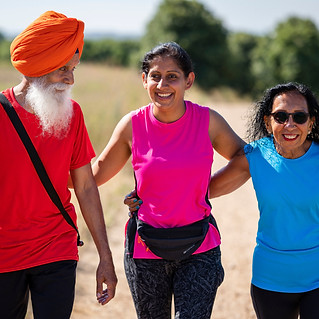
The digital divide
How we can help those offline feel more connected
We are living in an increasingly digital world: from school and work to socialising, shopping and accessing essential services like banking, benefits and healthcare. It’s now widely assumed that most people are online but that isn’t the case. Research from the Good Things Foundation shows that 10 million people in the UK have very basic or no digital skills, and 1.5 million households have no internet access at all [1]. Age UK reports that 79% of all digital exclusion is experienced by those aged 65+.
The reasons for not being online vary. Some people might choose not to be online, while others have fears about security or lack the technology skills but don't feel they can ask for help. Cost can be a major barrier—two million UK households struggle to pay for internet access, while others cannot afford a device like an iPad or computer. Or else, an individual may have been given a device but have little idea or guidance on how to use it.
The digital divide is real and looks set to deepen. What can be done to help those who live offline feel more connected?
Challenge the assumption that everyone is online
Try to understand and respect people’s reasons for not being online and make other provisions to help them. If you’re a local service provider, you could invest in IT skills courses and training so people can access services more easily. On an individual basis, you could take time out to help a family member or neighbour learn how to use their device if they're not tech-savvy or lack confidence.
Offer offline support if you’re a business
For many people, everyday tasks like going to the bank and the shops were a chance to socialise. With the rise of automated checkouts and paying-in desks, many people are missing that vital human connection, as well as struggling to pay at card-only tills. Encouragingly, there have been recent calls to supermarkets like Tesco to bring back more shop front staff, while banks like Lloyds have been training staff to offer non-digital options to customers. If you’re part of an organisation or company, make sure you have offline support for people who can’t use a website, including visible phone numbers and easy in-person access. Make offline support a priority rather than an afterthought or add-on.
Bring back real-life encounters
While being online offers many chances to connect, from WhatsApp groups to online clubs and forums, it can exclude those who aren't digitally connected from their communities and even their own families. Many leisure and entertainment bookings can only be made through a website, while family members can miss out on news and general chit-chat if they can't access social media or don't have instant messaging. Don’t always default to technology, and think about how people can access events and services. From a personal point of view, if you know someone isn’t online, call them on the phone instead, consider written correspondence or visit them in person.
Want to do more?
-
Age UK is a great resource for information about offline support and services. Their free advice line is 0800 678 1602 and is open 8 am-7 pm or visit ageuk.org.uk
-
Use your local library as an information hub to find out about events or to advertise your services.
-
For people who want to improve their IT skills, the Good Things Foundation’s ‘Learn My Way’ is a free learning platform to start your digital journey. Find out more at learnmyway.com.
-
Contact your local MP to raise awareness of digital exclusion in local services and of the wider recognition of people's rights offline.
.png)



.jpg)